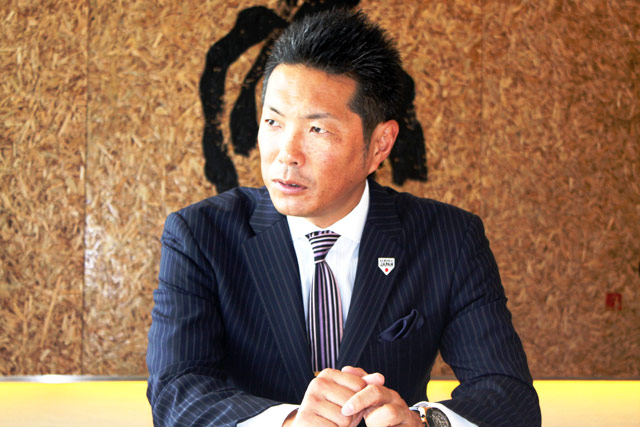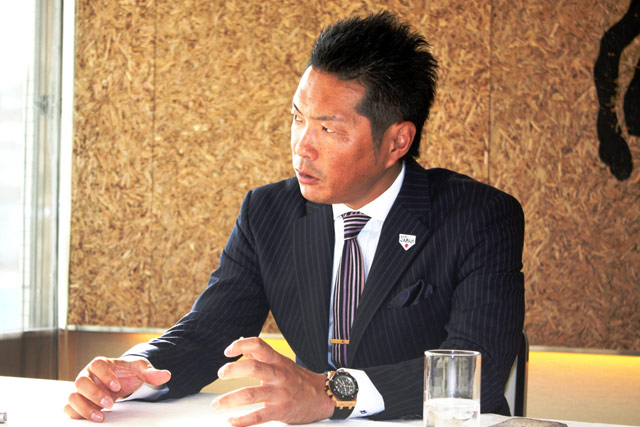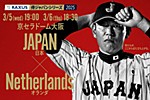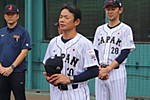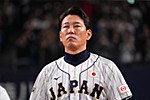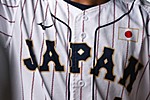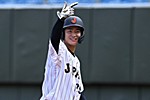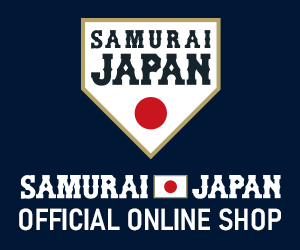In 2015, with the coming of spring, the Japanese national baseball team "Samurai Japan" once again set into motion. Following the All-Star Series last November, and the All Euro game (Tokyo Dome) in March, they are set to play in the "Premier 12", held on November 8th... As they face this new challenge to seek the "summit of the world", we asked Manager Hiroki Kokubo about his enthusiasm.
――You have announced the 26 players for the training game with All Euro in March. What were your selection points for these members?
First of all, we chose young and active players to be one of our standards for selection. We included a lot of young players in our pitching line this time, and part of that is because we anticipate their future growth. On the other hand, the outfielders have not changed much since the All-Star Series last November. I think that there will be many replacements in our pitching lines from here on, but the current outfielders will have to keep on playing as the core of Japan until the 2017 WBC or so. I hope that the players can be aware of that as well.
――What do you think of the significance of assembling the players for a match in March?
It is extremely significant for the players to assemble and play games in March, even just two, instead of just once a year. Bonding as a team is incredibly important to winning. It's especially important on a national team to create an environment where the players will not be reserved with each other. The collaboration of the 12 NPB teams is indispensable for that. During the spring camp, I went around to the managers of each team and explained the national team's schedule and the competition, but my hope is that it becomes natural that players who become professionals and flourish in Japan and will eventually be chosen as a member of Samurai Japan. We're currently at the awareness-building stage.
――"Samurai Japan" was permanently installed the year before last. Do you feel the effects of that?
Baseball in Japan is entering an age where world competitions are indispensable. Unless the baseball population increases with the base expanding, the people at the top don't reach a higher level. Particularly in Japan, with its declining birthrate, and more options than before, it has become more difficult to choose baseball as a sport. In that sense, we were in a situation where we had to go about preparing a national team. As the manager of the top team, I consider it my duty and mission to act with recognition of the problem that is expanding our base. And since this has led to people in all age groups playing while wearing the same uniform, it is important for the players at the top to always be aware that they are a model for these people.
――In press conferences, we heard the words "my thoughts" from you. What are the thoughts of "Kokubo Japan"?
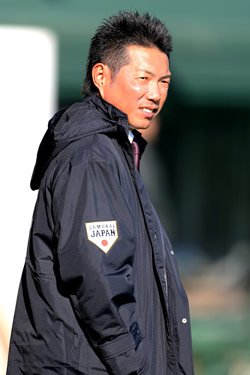
First, for the players in the top team, because they have been brought up in baseball to this point, they have to properly return the favor to baseball. And this does not mean simply playing baseball. In Japan, whenever one tries to master anything, the word "Do", or "way", is always appended to it. This began with Budo, then Judo, Kendo, Kyudo (archery), Sado (tea ceremony), Kado (flower arrangement), Shodo (calligraphy)... Because of that, I want the chosen players to be conscious not of "baseball", but of "baseball-do". A Judo practitioner never enters the dojo and spits on the mat. To us, the grounds are our dojo We can never spit on it. This may seem old-fashioned, but because we do bear the name of "Samurai", I want us to approach this with that level of awareness. Those are my thoughts.
――You have also told the players, "When moving between grounds, keep your hat on", correct?
I say this in the first meeting every time the team assembles. Some players have heard this twice or three times, and I think there will be players that hear the same thing four or five times, but I want to continue this anyway. If more players will gradually become aware of this through me saying the same thing over and over, these players will play with the same feelings even when they return to their own teams. And I want this to be a model for other young players.
――Is there any things you want to test in terms of commands and strategy, in advance of the All Euro game this March?
The first thing is that we have not invited the head coach, Mr. Narahara, this time. Therefore, during the matches I have to directly give signs and interact with the third-base coacher Nishi. This is a first for me. This is a test for in case the limit of people on the bench becomes smaller in the "Premier 12" this November. If we are eventually allowed six coaches, then that's fine, but if we can only have three, like in the Olympics, then our head coach will not be allowed in the bench. Before the contents of commands and such, it's important for the signs to be transmitted accurately and speedily to the players, and for them to be shared in the team. We want to avoid a variety of risks in face of the game in November.
――Are you thinking about the team composition for the "Premier 12" in November?
This is a test, and the real game is in November. The "Premier 12" will be the true challenge, and I want to be in position to form a "true top team". Furthermore, what I felt in the All-Star Series last year was that the higher the player's enthusiasm and sense of purpose towards "Samurai Japan", the better performance they exhibit on the grounds. The schedule for "Premier 12" has already been determined, so the way we use the time to prepare for it will change based on our awareness of it. The more players with high awareness we have, the greater our chances of winning. We want to choose these kinds of players after the season finishes. And the more players assemble with high awareness on the day we assemble, the better results we will have.
――As you face new challenges in 2015, do you have a message for the Japanese fans?
First of all, I want to address the jobs before me with all my might. Among these is the "Premier 12" competition being held in November of this year. Results in that competition aside, I want the public to recognize that Samurai Japan itself will continue forever. I think that this recognition has spread, influenced by the All-Star Series last year. Also, there have been many players wearing the Samurai Japan uniform on New Year's TV programs. I want to create an engaging top team that matches up to the attention and the expectations.
――We hope that you will show many Japanese your moment of joy.
Of course. There is nothing engaging about a losing team. The engagement comes with "winning", and we hope to continue to seek victory.
![]()
